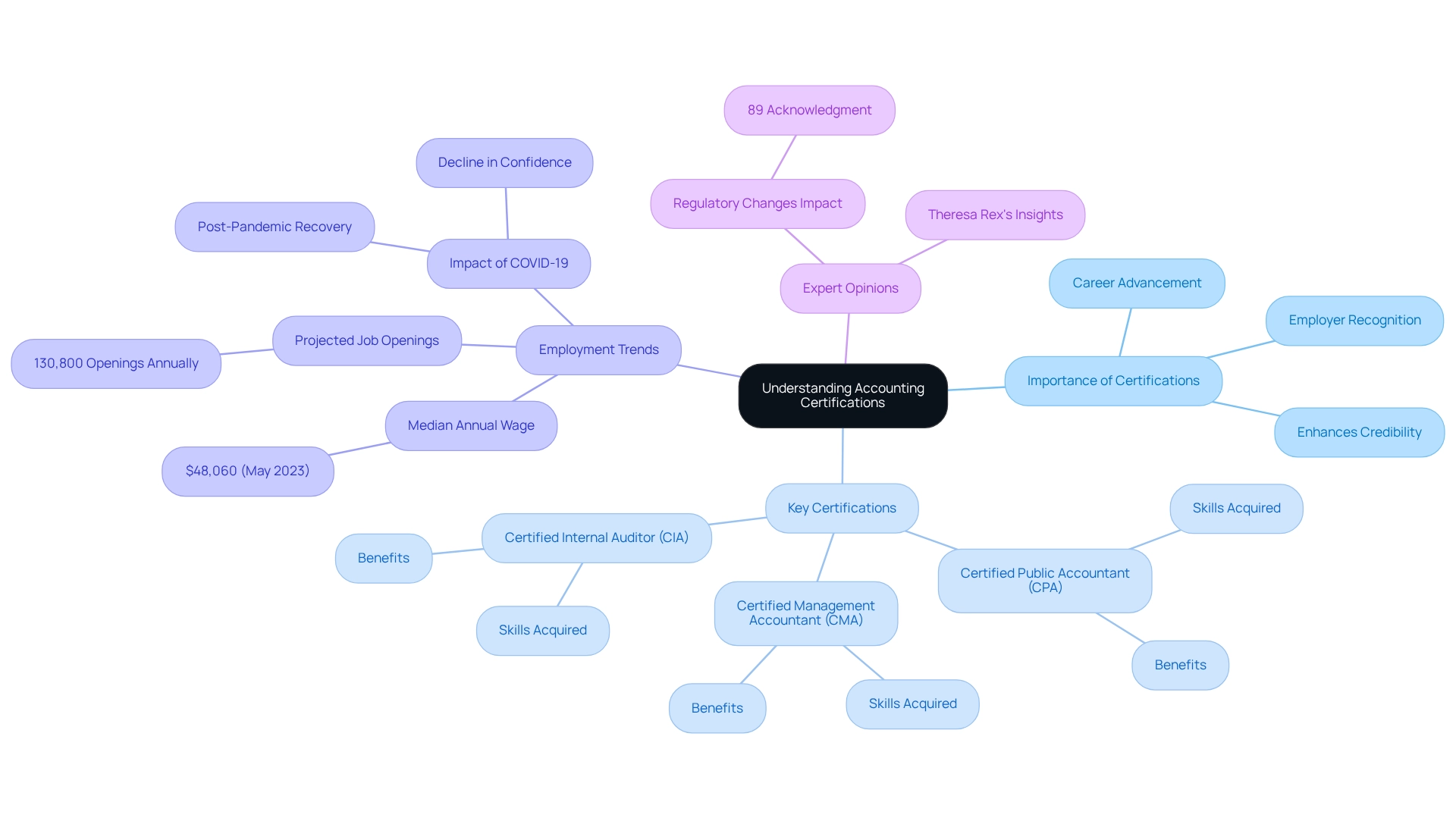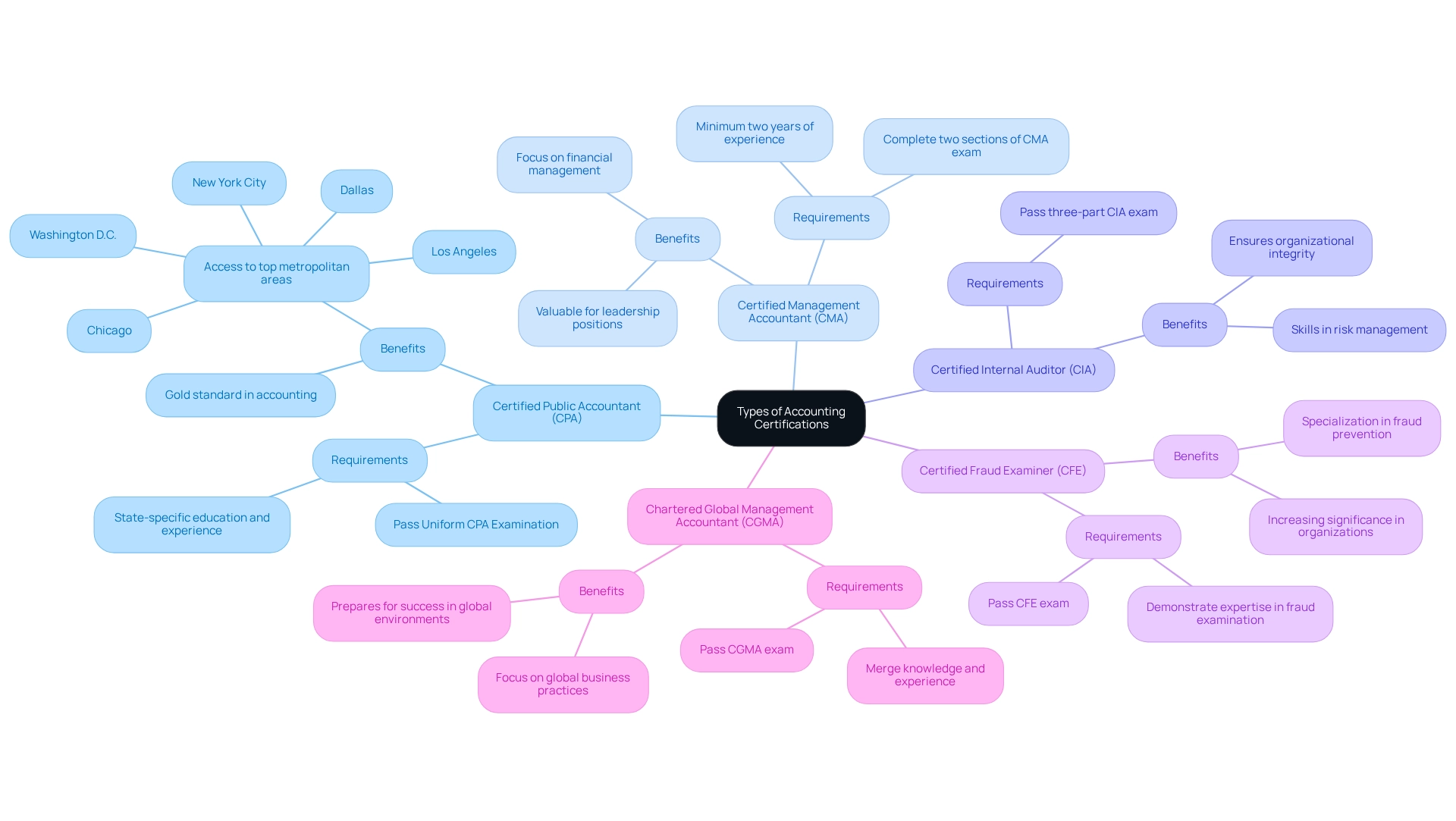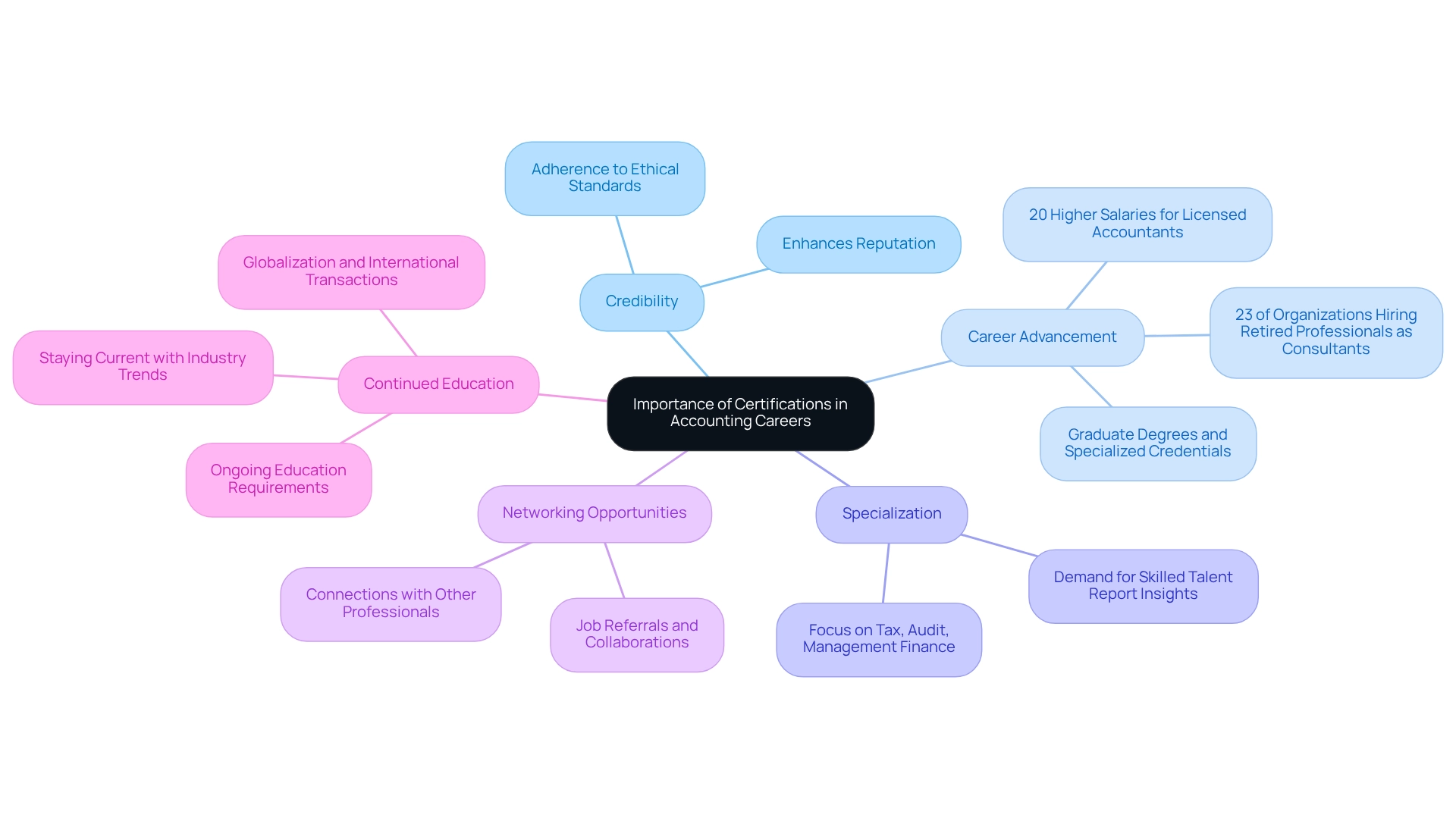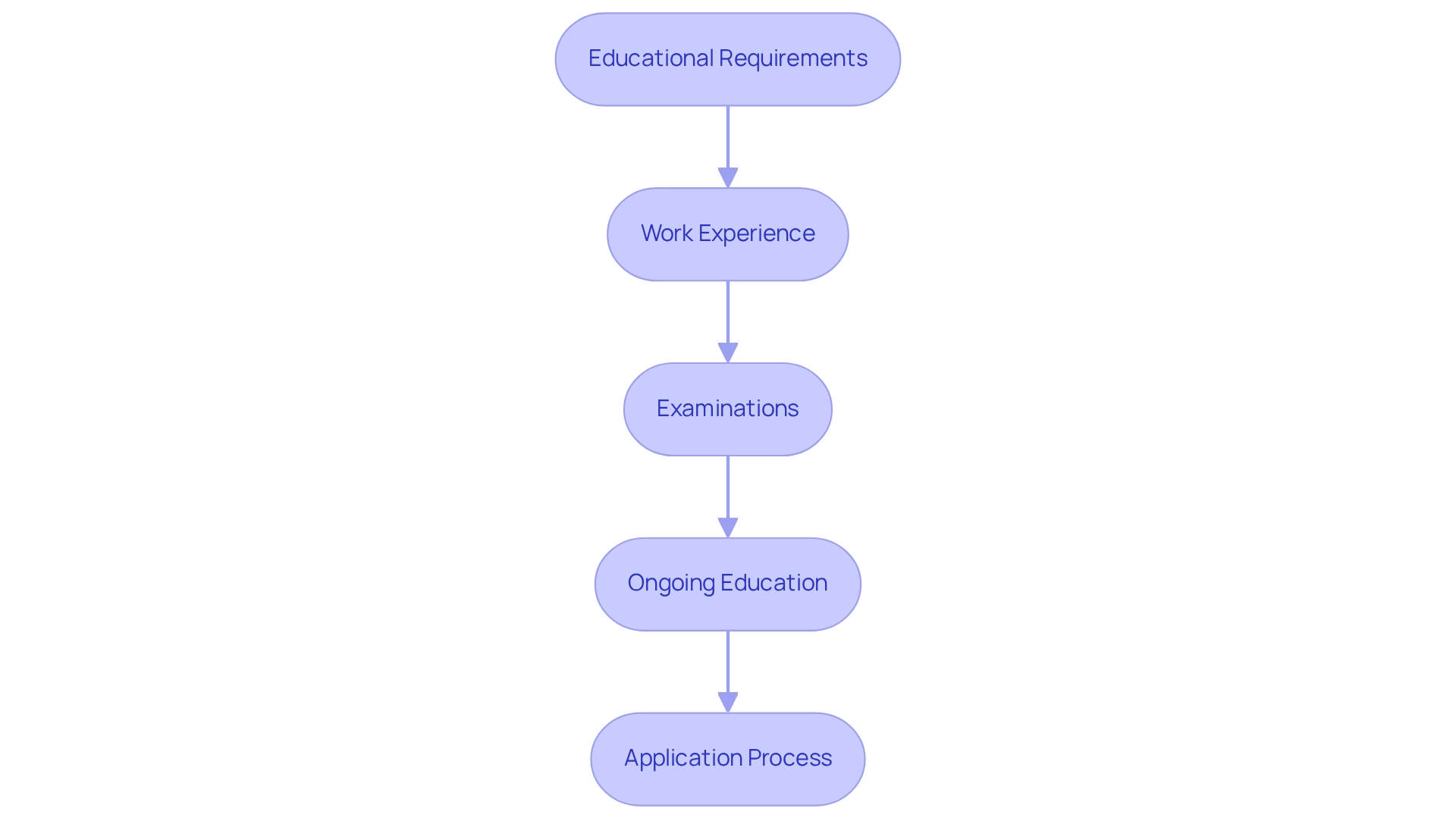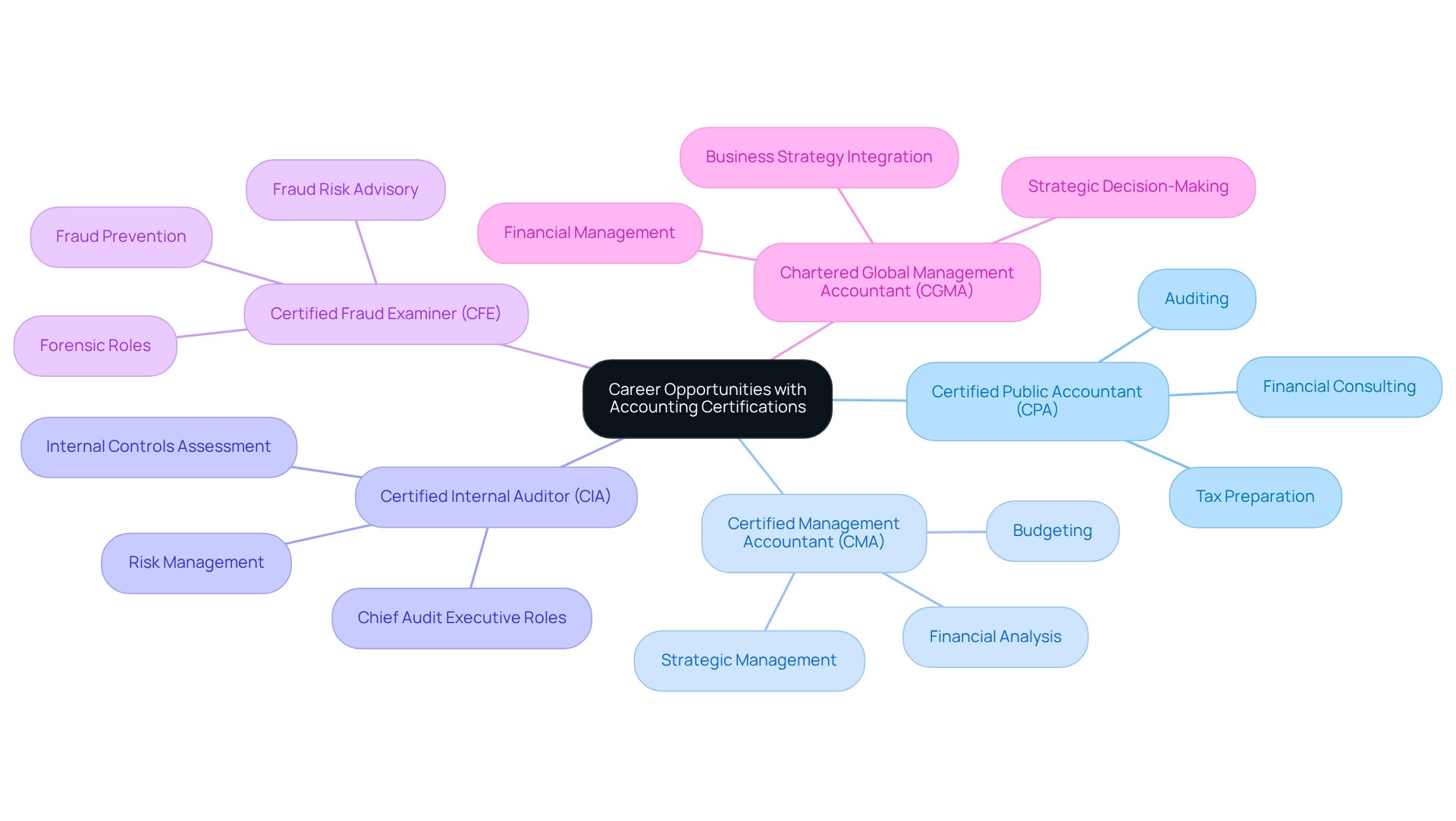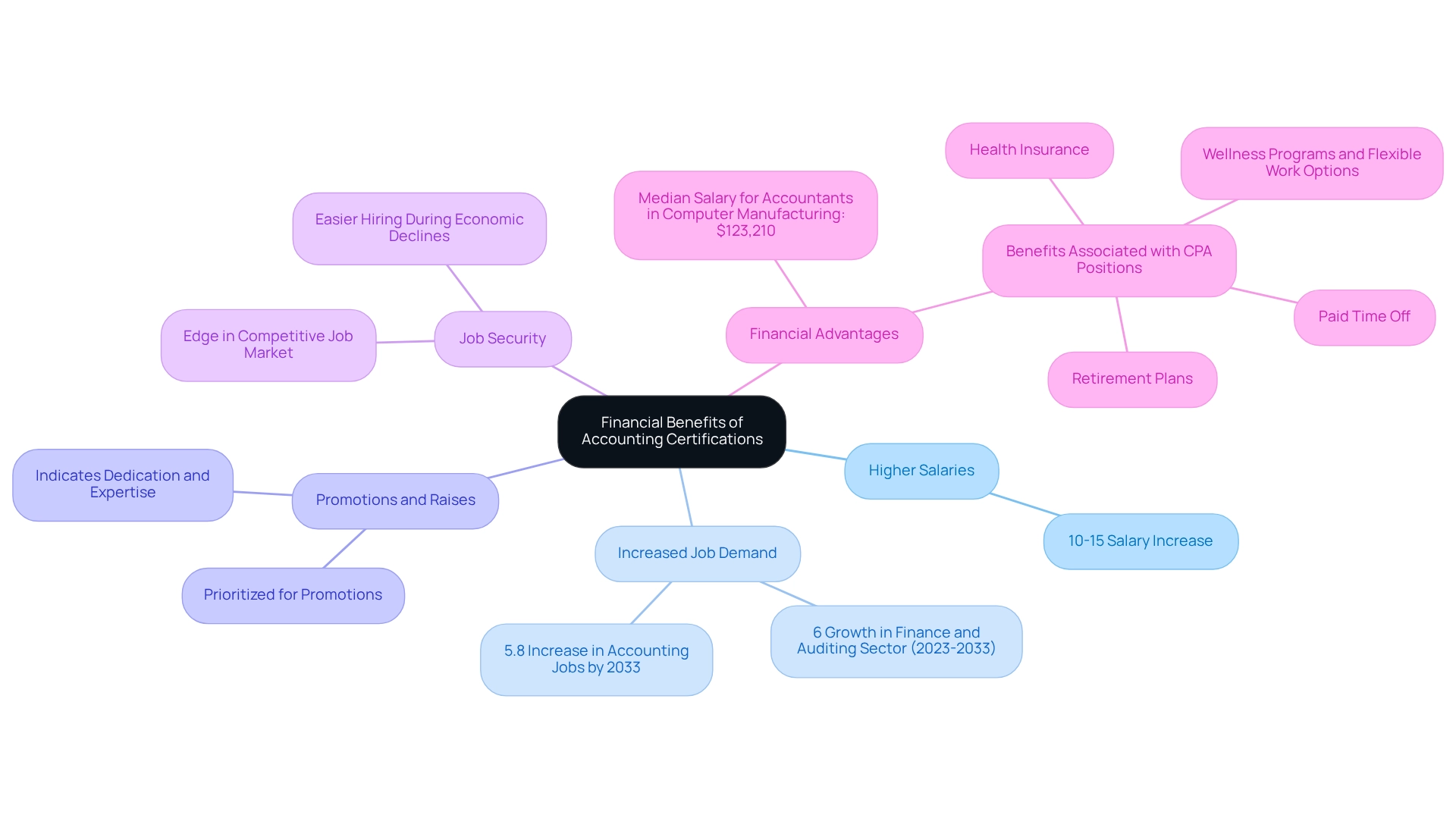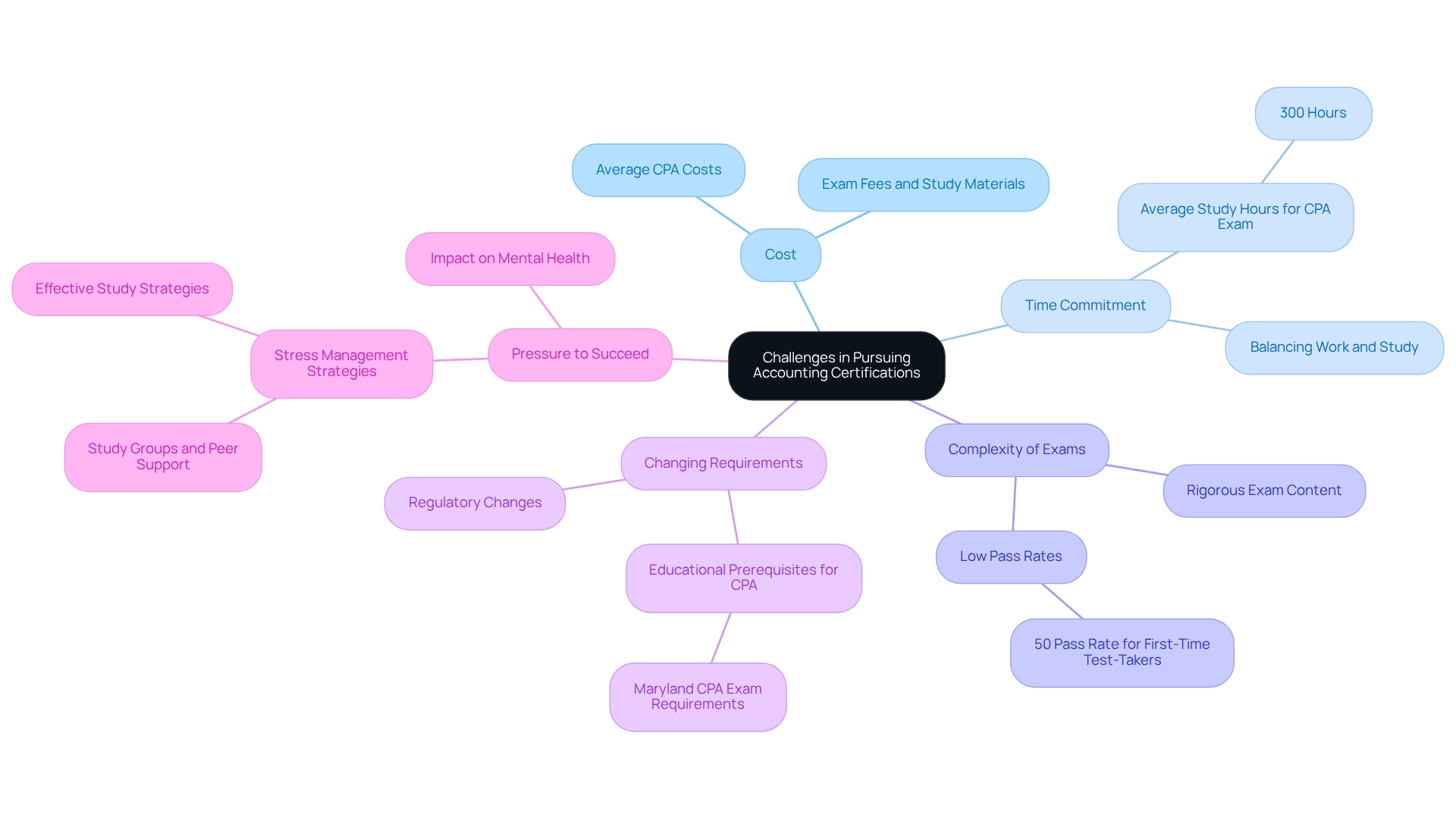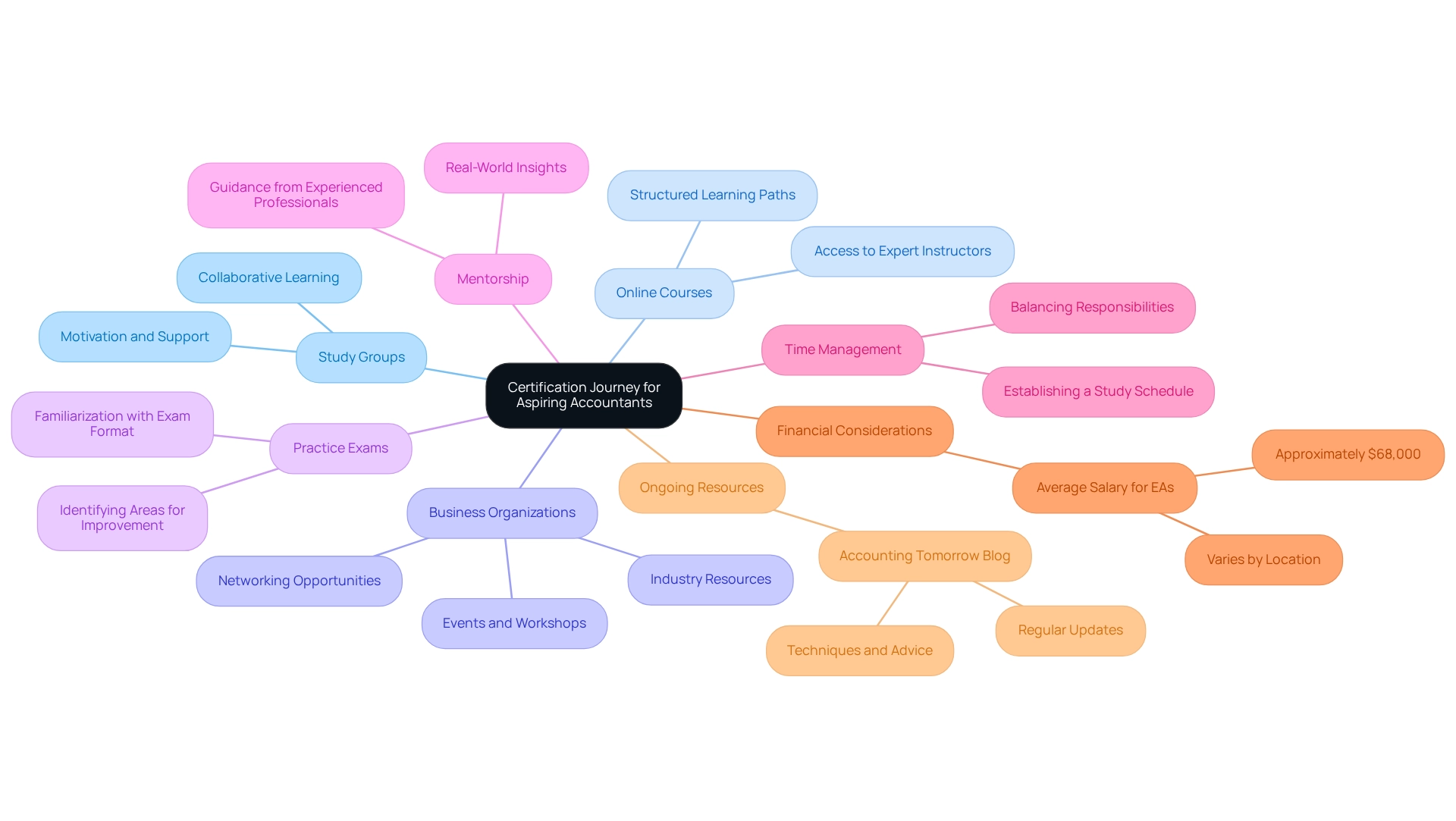Overview
Certifications for accountants, including CPA, CMA, and CIA, represent essential credentials that significantly enhance professional credibility, job prospects, and earning potential within the competitive financial sector. Notably, certified accountants typically earn 10-15% more than their non-certified counterparts. This statistic underscores the growing demand for skilled professionals in the field, making these certifications crucial for career advancement and job security. In a landscape where recruitment challenges are prevalent, the value of such qualifications cannot be overstated.
Key Highlights:
- Accounting certifications affirm expertise and knowledge in specialized areas, enhancing credibility and employment opportunities.
- Key certifications include Certified Public Accountant (CPA), Certified Management Accountant (CMA), and Certified Internal Auditor (CIA), each representing high professionalism.
- Projected demand for accountants is 130,800 positions annually over the next decade, emphasizing the importance of certifications for job market competitiveness.
- Certified professionals typically earn 10-15% more than non-certified counterparts, with certifications leading to higher salaries and job security.
- Obtaining certifications requires a bachelor’s degree, relevant work experience, passing rigorous exams, and ongoing education to maintain credentials.
- Networking opportunities through credentialing programs can facilitate career growth and job referrals.
- Challenges in obtaining certifications include significant costs, time commitments for exam preparation, and the complexity of the exams.
- Resources such as study groups, online courses, and mentorship can aid aspiring accountants in navigating their certification journey.
Introduction
In the dynamic world of finance, accounting certifications serve as essential pillars that not only validate expertise but also significantly enhance career trajectories. With the demand for skilled accountants on the rise, aspiring professionals are increasingly recognizing the value of these credentials in setting themselves apart in a competitive job market.
From the prestigious Certified Public Accountant (CPA) to the specialized Certified Management Accountant (CMA), these certifications unlock a multitude of opportunities while underscoring a commitment to ethical standards and ongoing professional development.
This article explores the various types of accounting certifications, their critical role in career advancement, the financial benefits they provide, and the pathways to obtaining these vital credentials, ultimately illuminating how they shape the future of accounting professionals.
Understanding Accounting Certifications: An Introduction
Certifications for accountants are essential professional credentials that affirm an individual’s expertise and knowledge in specialized areas of accounting. For financial professionals aiming to enhance their credibility and employment opportunities, these certifications are indispensable. They not only demonstrate a commitment to the profession but also typically require candidates to pass rigorous assessments and meet specific educational and experience criteria.
Among the most recognized qualifications are the Certified Public Accountant (CPA), Certified Management Accountant (CMA), and Certified Internal Auditor (CIA). Each of these certifications represents a high level of professionalism and skill, making them crucial for both aspiring accountants and employers seeking qualified candidates.
The importance of financial qualifications in 2025 cannot be overstated, especially considering the projected 130,800 positions for accountants and auditors annually over the next decade. This demand underscores the necessity for professionals to distinguish themselves through certifications, significantly enhancing their employment prospects. Employers increasingly recognize that applicants with certifications are often better equipped to navigate the complexities of the financial sector, particularly in a competitive job market.
Recent trends indicate a growing emphasis on credentials as a pathway to career advancement. For instance, the Certified Public Accountants Outlook Index highlighted a significant decline in confidence among accountants during the COVID-19 pandemic, reaching an unprecedented low in the third quarter of 2020. However, as the sector recovers, the importance of certifications has become more apparent, with many professionals leveraging these qualifications to restore confidence and credibility in their roles.
Practical examples illustrate how financial qualifications bolster credibility. For instance, professionals holding certifications like the CPA designation frequently report higher earning potential and enhanced job security. According to the Bureau of Labor Statistics, the median annual income for all employees was $48,060 as of May 2023, yet individuals with advanced qualifications typically earn considerably more.
Expert opinions further highlight the significance of professional credentials. A survey indicated that 89% of participants acknowledged that regulatory changes mandated by government and industry organizations have influenced workplace practices and culture in the field. Theresa Rex noted that these changes compel financial professionals to stay informed about industry standards, which credentials help promote.
In conclusion, certifications for accountants are not merely optional qualifications; they are vital tools for career advancement and professional credibility in the accounting sector. As the industry evolves, the importance of these certifications will continue to grow, making them a critical factor for both candidates and employers. Furthermore, understanding state-specific employment growth data can further inform both applicants and employers about the shifting job market for financial professionals, ensuring they make informed decisions regarding qualifications.
Types of Accounting Certifications: A Breakdown
In the financial field, various qualifications, such as certifications for accountants, serve distinct specializations, each offering unique benefits that can significantly enhance career opportunities. The most notable credentials include:
- Certified Public Accountant (CPA): Widely regarded as the gold standard in accounting, the CPA designation is essential for accountants who file reports with the SEC. To obtain this credential, candidates must successfully pass the Uniform CPA Examination and fulfill state-specific education and experience requirements. As highlighted by Imed Bouchrika, the top metropolitan regions for CPAs consist of New York City, Chicago, Los Angeles, Washington D.C., and Dallas, emphasizing the geographical opportunities accessible for accredited individuals.
- Certified Management Accountant (CMA): This credential is tailored for individuals concentrating on financial management and strategic decision-making within corporate finance. Candidates must complete two sections of the CMA exam and possess a minimum of two years of pertinent experience, making it a valuable asset for those aspiring to leadership positions.
- Certified Internal Auditor (CIA): Created specifically for internal auditors, the CIA credential requires candidates to pass a challenging three-part exam. This credential emphasizes critical skills in risk management and internal control, essential for ensuring organizational integrity.
- Certified Fraud Examiner (CFE): Targeted at professionals specializing in fraud prevention and detection, the CFE credential mandates candidates to demonstrate expertise in fraud examination and successfully pass the CFE exam. This credential is increasingly significant as organizations prioritize fraud risk management.
- Chartered Global Management Accountant (CGMA): Designed for management professionals, the CGMA designation focuses on global business practices and strategic management. Applicants must merge knowledge and experience with successful completion of the CGMA exam, preparing them for success in global business environments.
Each of these certifications for accountants serves a specific role and can greatly impact a professional’s career trajectory. For instance, individuals who have acquired these qualifications frequently report improved job prospects and greater earning potential. In fact, senior-level government financial professionals with a CGFM certification can earn between $94,250 and $136,500 annually, underscoring the financial benefits of advanced certifications.
As the financial landscape continues to evolve, flexibility and adaptability will be crucial for professionals seeking to navigate future developments in the field. Additionally, trends such as cash flow management and machine learning are transforming financial operations by enhancing invoicing, accelerating payments, and providing real-time insights, further emphasizing the necessity for accountants to stay current with industry advancements. Moreover, the dominance of QuickBooks in small enterprise financial management, with a 44% market share in the U.S., demonstrates the practical significance of finance qualifications for individuals involved with small businesses.
The Importance of Certifications in Accounting Careers
Certifications are essential in the accounting profession for a variety of compelling reasons:
-
Credibility: Obtaining a credential signifies a strong commitment to the profession and adherence to ethical standards, significantly enhancing an accountant’s reputation among peers and clients. This credibility is crucial in a competitive job market where trust is paramount.
-
Career Advancement: A significant number of employers prioritize or mandate qualifications for higher-level positions. Certified experts not only enjoy better job prospects but also command higher salaries. For example, obtaining a graduate degree or specialized credentials such as the CPA can lead to significant salary boosts, with licensed accountants often earning up to 20% more than their non-licensed peers, particularly due to their certifications for accountants. Moreover, 23% of organizations are employing retired finance and fiscal experts as consultants, emphasizing the changing job market and the importance of qualifications in adjusting to these transformations. Boutique Recruiting can help candidates in exploring these possibilities, ensuring they utilize their credentials effectively during the job search process.
-
Specialization: Certifications allow accountants to focus on essential fields such as tax, audit, or management finance. This specialization not only enhances their marketability but also aligns with the increasing demand for certifications for accountants in specific sectors, as highlighted in the Demand for Skilled Talent report by Robert Half. This report highlights the significance of attracting and keeping talent in the accounting sector, rendering qualifications even more pertinent. Positions like CAO, Controller, and Staff Accountant gain substantial advantages from specialized qualifications.
-
Networking Opportunities: Numerous credentialing programs promote connections with other individuals in the field, which can result in beneficial job referrals and career growth. Engaging with a community of certified professionals can open doors to new opportunities and collaborations. As Stephanie Kelly, Chief People Officer worldwide for the London-based IRIS Software Group, remarked, “We are overwhelmed with individuals who wish to spend brief periods with their laptop in different locations across the globe,” suggesting a change in work preferences that qualifications can assist in managing.
-
Continued Education: Maintaining credentials typically requires ongoing education, ensuring that financial professionals remain current with industry trends and regulatory changes. This dedication to lifelong learning is becoming more crucial as globalization fuels the need for professionals knowledgeable in international transactions, trade, and mergers and acquisitions.
In summary, certifications for accountants are not merely a credential; they are a strategic asset for accountants aiming to enhance their careers, demonstrate expertise, and secure a competitive edge in the evolving financial landscape. Boutique Recruiting is here to assist candidates in enhancing the value of their qualifications and navigating the job market effectively.
How to Obtain Accounting Certifications: Requirements and Processes
Acquiring financial qualifications involves several critical steps that candidates must navigate effectively:
-
Educational Requirements: Most qualifications necessitate a bachelor’s degree in accounting or a related field. For example, the CPA designation requires candidates to complete 150 semester hours of education, which typically translates to obtaining a master’s degree.
-
Work Experience: Relevant work experience serves as a common prerequisite. Aspiring CPAs, for instance, must accumulate a specified number of hours working under the supervision of a licensed CPA, ensuring they gain practical insights into the profession.
-
Examinations: Candidates must successfully pass one or more examinations to obtain their qualifications. The CPA exam comprises four sections, while the CMA exam is divided into two parts, each assessing critical knowledge and skills necessary for the field. Additionally, to earn the EA designation, candidates must pass the Special Enrollment Examination (SEE), with exam dates available year-round.
-
Ongoing Education: After obtaining credentials, individuals are required to complete ongoing education courses to retain their qualifications. This ongoing education is vital for staying abreast of industry developments and best practices.
-
The application process for certifications for accountants requires candidates to submit applications to the relevant certifying body, which typically includes documentation of their educational background, work experience, and exam scores. Navigating these steps is crucial for anyone considering a career in accounting, as it provides a roadmap for planning their educational and professional journeys effectively. For instance, the path to becoming a CMA can take around nine years, emphasizing the dedication needed for these qualifications. When comparing the expenses related to CPA and CMA qualifications, both begin at approximately $1,000 for exam fees; however, the total financial obligation can differ greatly depending on additional costs involved in the CPA process. A case study shows that while the CPA has a broader range of fees associated with its exam, the CMA exam fees are more comparable. Employers recognize the extensive expertise acquired from certifications for accountants, which can lead to greater opportunities, enhanced earning potential, and a rewarding career trajectory.
Career Opportunities with Accounting Certifications
The role of certifications for accountants is pivotal in broadening career opportunities for individuals in the field. Here are some key career options available to certified individuals:
-
Certified Public Accountant (CPA): CPAs are adaptable specialists who can work in public accounting firms, corporate finance departments, or as independent consultants. Their responsibilities often include tax preparation, auditing, and providing financial consulting services. With a median salary of $76,230 for accountants in management roles, CPAs are well-compensated for their expertise. Furthermore, with an estimated 75% of CPAs anticipated to retire in the next 15 years, the need for qualified professionals is pressing, making credentials increasingly important.
-
Certified Management Accountant (CMA): CMAs typically find their niche in corporate finance, where they focus on financial analysis, budgeting, and strategic management. Common positions include financial manager and controller, roles that are increasingly vital as organizations seek to enhance their financial performance.
-
Certified Internal Auditor (CIA): CIAs are essential within organizations, tasked with assessing risk management and internal controls. Their career path can result in senior roles like chief audit executive, highlighting the increasing significance of internal auditing in corporate governance.
-
Certified Fraud Examiner (CFE): CFEs focus on fraud prevention and detection, often assuming forensic roles or advising organizations seeking to reduce fraud risks. Their expertise is crucial in today’s environment, where financial integrity is paramount.
-
Chartered Global Management Accountant (CGMA): CGMAs typically occupy leadership roles, focusing on strategic decision-making and financial management. Their skill in incorporating financial insights into wider business strategies renders them essential resources for companies.
These qualifications not only improve employment opportunities but also create pathways for career growth and expertise in diverse financial areas. As the demand for skilled accountants continues to grow, organizations are increasingly hiring retired finance and accounting experts as consultants to address staff shortages, emphasizing the need for both technical and interpersonal skills in the hiring process. This trend highlights the importance of obtaining relevant certifications for accountants to remain competitive in the evolving job market.
Additionally, exploring multiple job opportunities can significantly impact career success, allowing professionals to find roles that best match their skills and aspirations. As Shannon Cantor noted, CPAs in Kansas enjoy roughly $33,285 of disposable income, compared to $19,710 for those living in New York, illustrating the financial benefits of pursuing a CPA designation. Insights from the Demand for Skilled Talent report by Robert Half further reinforce the relevance of these trends, providing a comprehensive view of employment challenges and strategies in the finance sector.
Boutique Recruiting focuses on specialized recruitment services for financial positions, assisting organizations in locating the suitable talent to fulfill their requirements.
Financial Benefits of Accounting Certifications: Salary and Demand Insights
Obtaining accounting certifications can lead to substantial financial benefits, including:
- Higher Salaries: Certified professionals typically command higher salaries compared to their non-certified counterparts. For instance, Certified Public Accountants (CPAs) frequently earn between 10-15% more than professionals without certifications. This salary differential underscores the value that employers place on certified expertise.
- Increased job demand for accountants is evident, particularly for those with certifications such as CPAs and Certified Management Accountants (CMAs). Employment forecasts suggest that the finance and auditing sector is anticipated to expand by 6% from 2023 to 2033, surpassing the average growth rate for all professions. As M.J. Grenzow observes, positions in accounting will increase by 5.8% by 2033, emphasizing the continuing demand for skilled individuals in the financial sector.
- Promotions and Raises: Certified professionals are frequently prioritized for promotions and salary increases. Employers recognize that certifications indicate a dedication to the profession and an elevated level of expertise, making certified accountants more appealing prospects for promotion.
- Job Security: In a competitive job market, certifications provide a considerable edge, improving job stability. Certified experts are often hired more easily during economic declines, as their qualifications are regarded as vital to organizational stability.
- The financial advantages of obtaining certifications extend beyond immediate salary increases. For example, financial professionals in computer manufacturing earn a median annual salary of $123,210, illustrating the lucrative opportunities available to certified experts. Additionally, benefits associated with CPA positions, such as health insurance, paid time off, and retirement plans, contribute to overall job satisfaction and financial well-being, as discussed in the case study “Benefits That Come With a CPA Job.”
In comparison, the median annual wage for all workers was $48,060 as of May 2023, providing context for how certified professionals’ salaries compare to the overall workforce.
Furthermore, candidates aiming to utilize their credentials can benefit from the targeted recruitment services provided by Boutique Recruiting. By exploring multiple job opportunities, candidates can navigate job offers more effectively, ensuring they find positions that align with their career goals. Overall, the financial advantages of acquiring certifications are substantial, making them a worthwhile investment for aspiring professionals in the field.
Challenges in Pursuing Accounting Certifications: What to Consider
Pursuing accounting certifications can be a highly rewarding endeavor; however, candidates often face several significant challenges:
- Cost: The financial investment required for qualification programs can be substantial. Candidates should anticipate expenses related to exam fees, study materials, and ongoing continuing education requirements. For instance, the average expense of acquiring a CPA license can vary from $1,000 to $3,000, depending on the resources utilized.
- Time Commitment: Preparing for qualification tests demands significant time and dedication. Candidates typically need to allocate hundreds of hours for study, often balancing this with work and personal responsibilities. Research indicates that candidates may spend an average of 300 hours preparing for the CPA exam alone, making effective time management crucial.
- Complexity of Exams: Certification exams, particularly the CPA exam, are renowned for their rigor. Candidates must engage in extensive study and practice to navigate the challenging content successfully. The pass rates for these exams can be low, with the CPA exam averaging around 50% for first-time test-takers, underscoring the need for thorough preparation.
- Changing Requirements: The landscape of qualification requirements is not static; they can evolve based on regulatory changes or industry standards. Candidates must remain vigilant and informed about any updates to ensure compliance with the latest criteria, which can add an additional layer of complexity to their preparation. For example, the program meets a portion of the educational prerequisites needed to sit for the CPA Exam in the state of Maryland.
- The pressure to succeed in obtaining certifications for accountants can lead to significant stress. Candidates are encouraged to develop effective study strategies and seek support from peers or mentors to alleviate this pressure. Engaging in study groups or utilizing online resources can provide valuable assistance and foster a supportive learning environment.
By acknowledging and tackling these obstacles, candidates can better prepare themselves for the journey, ultimately improving their chances of success in reaching their professional objectives. Furthermore, it is important to mention that individuals with Certified Information Systems Auditor credentials can potentially earn 22% more, emphasizing the financial advantages of obtaining such qualifications. As highlighted by Amy, a candidate who mentioned, “The certificate program in finance prepared me for my current role as an assistant in finance.”
The hands-on courses and practical knowledge I gained made transitioning into the workforce smooth and rewarding. I feel confident and capable every day. This demonstrates the positive effect of accounting credential programs on candidates’ careers.
Moreover, Boutique Recruiting’s remarkable history of content clients and candidates strengthens its standing as a reliable ally for individuals seeking qualifications.
Resources and Tips for Aspiring Accountants: Navigating Your Certification Journey
Aspiring accountants have the opportunity to leverage a variety of resources and strategies to successfully navigate their certification journey.
- Study Groups: Forming or joining study groups not only fosters motivation but also builds support among peers. Collaborative learning enhances understanding and retention of intricate material, significantly boosting the likelihood of success in qualification tests. This approach aligns with Boutique Recruiting’s commitment to building lasting relationships, as evidenced by their numerous satisfied clients and candidates.
- Online Courses: A wealth of platforms, including Coursera and LinkedIn Learning, offer tailored online courses specifically designed for certification exam preparation. These courses provide structured learning paths and access to expert instructors, making them invaluable resources for candidates.
- Business Organizations: Membership in esteemed groups such as the American Institute of CPAs (AICPA) or the Institute of Management Accountants (IMA) grants access to networking opportunities, industry resources, and events that can enhance both expertise and connections. Notably, the AICPA seeks to increase the number of specialists with PhDs in accounting, underscoring the significance of advanced qualifications in the field.
- Practice Exams: Engaging in practice exams allows candidates to familiarize themselves with the exam format while pinpointing areas needing improvement. This proactive approach can significantly boost confidence and readiness on exam day.
- Mentorship: Seeking guidance from experienced individuals can provide essential insights into the credentialing process and career growth. Real-world examples of mentorship underscore its effectiveness in guiding candidates through challenges and enhancing their professional development. As Sean Peek notes, ‘Generally, a certified EA possesses extensive experience in tax preparation for a broad range of federal and state tax returns,’ emphasizing the importance of credentials and the knowledge they confer.
- Time Management: Establishing a study schedule with specific goals helps candidates remain organized and focused. Effective time management is crucial for balancing study commitments with other responsibilities, ensuring a comprehensive preparation experience.
Moreover, aspiring financial professionals should evaluate the monetary advantages of obtaining credentials; for instance, the average yearly income for EAs is approximately $68,000, which can fluctuate significantly by region. By utilizing these resources and strategies, aspiring accountants can significantly enhance their likelihood of successfully obtaining their certifications and advancing their careers. The dedication to ongoing education and career advancement is essential in the ever-evolving domain of finance.
Furthermore, resources like the blog ‘Accounting Tomorrow’ provide ongoing techniques and advice, making it an invaluable resource for students and young professionals in the accounting field.
Conclusion
Accounting certifications serve not merely as a pathway to enhanced career opportunities; they represent crucial investments in professional development and marketability. The critical role of certifications such as CPA, CMA, and CIA has been emphasized, illustrating their capacity to elevate credibility, unlock specialized roles, and significantly boost earning potential. With the demand for skilled accountants on the rise, these credentials are increasingly indispensable in a competitive job market.
Furthermore, the financial advantages linked to obtaining these certifications are substantial. Certified professionals typically command higher salaries, enjoy greater job security, and experience enhanced prospects for promotions compared to their non-certified counterparts. Insights into the evolving job landscape underscore the urgency for aspiring accountants to pursue these qualifications, ensuring they remain relevant and attractive to employers.
While the journey to securing accounting certifications may present challenges—such as costs, time commitments, and intricate examinations—the rewards far outweigh these obstacles. By utilizing available resources—such as study groups, online courses, and mentorship—candidates can navigate their certification journey more effectively, ultimately paving the way for a successful and fulfilling career in accounting. The dedication to continuous learning and adherence to ethical standards, reinforced through these certifications, will undoubtedly shape the future of the accounting profession. Are you ready to invest in your future and ensure your place in this competitive field?
Frequently Asked Questions
Why are certifications for accountants important?
Certifications for accountants are essential professional credentials that affirm an individual’s expertise and knowledge in specialized areas of accounting. They enhance credibility, employment opportunities, and demonstrate a commitment to the profession.
What are some of the most recognized accounting certifications?
The most recognized accounting certifications include the Certified Public Accountant (CPA), Certified Management Accountant (CMA), and Certified Internal Auditor (CIA).
How do certifications impact employment opportunities for accountants?
Certifications significantly enhance employment prospects for accountants by distinguishing them in a competitive job market. Employers recognize that certified candidates are often better equipped to navigate the complexities of the financial sector.
What is the projected demand for accountants and auditors in the coming years?
There is a projected demand for 130,800 positions for accountants and auditors annually over the next decade, highlighting the importance of financial qualifications.
How do certifications affect earning potential for accountants?
Professionals holding certifications like the CPA designation typically report higher earning potential and enhanced job security compared to those without such qualifications.
What are the requirements for obtaining the Certified Public Accountant (CPA) certification?
To obtain the CPA certification, candidates must pass the Uniform CPA Examination and fulfill state-specific education and experience requirements.
What is the focus of the Certified Management Accountant (CMA) certification?
The CMA certification is tailored for individuals concentrating on financial management and strategic decision-making within corporate finance, requiring candidates to complete two sections of the CMA exam and have a minimum of two years of relevant experience.
What does the Certified Internal Auditor (CIA) certification emphasize?
The CIA certification emphasizes critical skills in risk management and internal control, requiring candidates to pass a challenging three-part exam.
Who is the Certified Fraud Examiner (CFE) certification aimed at?
The CFE certification is targeted at professionals specializing in fraud prevention and detection, requiring candidates to demonstrate expertise in fraud examination and pass the CFE exam.
What is the significance of the Chartered Global Management Accountant (CGMA) certification?
The CGMA certification focuses on global business practices and strategic management, requiring candidates to merge knowledge and experience with successful completion of the CGMA exam.
How do trends in the financial landscape affect the need for certifications?
As the financial landscape evolves, trends such as cash flow management and machine learning are transforming financial operations, emphasizing the necessity for accountants to stay current with industry advancements and qualifications.
